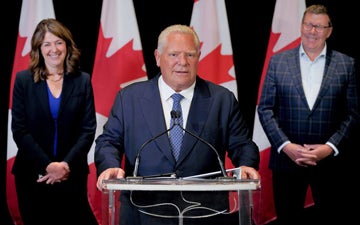Ford and Smith divided over Trump response at premiers’ summit

An electricity export tax is a the centre of a disagreement between premiers Doug Ford and Danielle Smith as to how best to respond to Trump tariff threats
HUNTSVILLE, July 23, 2025 – Conservative premiers Doug Ford of Ontario and Danielle Smith of Alberta are at odds over how Canada should respond to US tariffs — especially when it comes to energy exports.
At a premiers’ summit in Huntsville on Tuesday, Ford refused to rule out an electricity export tax, while Smith firmly said no.
“We don't want to see export taxes on energy or export restrictions. It would have a devastating impact on Alberta and on Canada,” Smith said at a joint press conference. “The Americans have a bigger hammer if they cut off [the Enbridge Line 5 pipeline]. Not only does that harm Ontario, it also harms Quebec.”
Ford took a different view. “Everything’s on the table,” he said. “We’ll see how this deal goes and we’ll see what he [Trump] has to say on August 1.”
President Donald Trump has said he will impose tariffs of up to 50 per cent on dozens of countries, including Canada, starting Aug. 1. Prime Minister Mark Carney downplayed the deadline, saying Canada’s focus is on getting the best deal possible, no matter how long it takes.
Ford, however, urged an aggressive response.
“We need to make sure we match tariff for tariff, dollar for dollar, and hit them back as hard as we possibly can,” Ford said. “There’s one thing President Trump understands — it’s strength. He doesn’t understand or appreciate weakness. He will roll over us like a cement roller if we show an ounce of weakness. We need to send a strong message.”
Ford and Smith, along with Saskatchewan Premier Scott Moe, signed a Memorandum of Understanding on Tuesday to build pipelines, rail lines and trade infrastructure aimed at reducing Canada’s reliance on US markets.
The premiers also called for repealing nine federal regulations they see as barriers to resource development, including Bill C-69, the tanker ban, the oil and gas emissions cap, federal carbon pricing and clean electricity rules.
The federal government hasn’t proposed an energy export tax, but experts say Canada should consider one. A 15 per cent levy on oil and gas could match Trump’s tariffs, raise billions and support workers and green investments.
‘The provinces are just bystanders’
Earlier this year, Ford briefly introduced a 25 per cent electricity export tax targeting Michigan, New York and Minnesota. He dropped it after Trump threatened to raise tariffs on Canadian steel, aluminum and cars. Still, Ford says the tax could return if trade talks fail.
“We don’t have to take a back seat to anyone in the world, and we sure as heck don’t have to take a back seat to President Trump,” Ford added.
Smith, however, says using Alberta’s oil as leverage in a trade fight is not an option; the province exports most of its oil to the US and she wants that trade to remain stable.
In 2023, Canada exported four million barrels of crude oil per day — 97 per cent of it to the US — and Alberta accounted for 87 per cent of that. The exports were worth $125 billion.
Ontario, meanwhile, sends electricity to US states such as Michigan and New York, powering more than 1.5 million American homes and businesses. US governors have warned that new energy taxes could raise costs and damage cross-border energy ties.
Fred Lazar, an economics professor at York University’s Schulich School of Business, says Ford’s tax idea is politically risky and argues this is a federal matter — not one provinces should try to handle alone. “This is really a dispute between Canada and the US. The provinces are just bystanders,” Lazar said. “Politically, they may have their own incentives, but practically, there’s nothing they can do that would compel the US to change its policies. All it would do is make life harder for Ottawa.”
Lazar believes the best move is for provinces to avoid taking action on their own and let Ottawa lead the negotiations. “They’re better off talking tough, doing nothing and letting Carney work it out.”
Sheldon Williamson, a professor at Ontario Tech University, said the Ford–Smith split weakens Canada’s bargaining power. “While both leaders want to push back against US tariffs, diverging approaches — especially on energy exports — undermine any unified Canadian stance,” he said. “Without cohesion, it becomes harder to exert meaningful pressure on Washington or to present a credible domestic front to Ottawa.”
For Ontario, the stakes are high. Its auto sector is deeply integrated with the US supply chain. “A broad-based tariff regime could be economically devastating,” Williamson said.
He warned that although an electricity export tax may seem like an easy lever, “it could backfire by raising prices for US consumers, inviting retaliation and damaging Ontario’s own cross-border energy ties.”
Abdul Matin Sarfraz is a Local Journalism Initiative reporter with Canada’s National Observer. Title image: Ford and Smith, along with Saskatchewan Premier Scott Moe, signed a Memorandum of Understanding on Tuesday to build pipelines, rail lines and trade infrastructure (Premier Ford X account).








(0) Comments